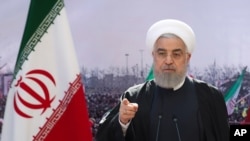Iran's parliament appears to have left in limbo the interim nuclear inspection accord reached over the weekend, saying that the government of President Hassan Rouhani overstepped its authority.
It remains unclear if the country’s Council of Experts, the ultimate arbiter in such matters, will revoke the agreement.
Parliament speaker Mohamed Baqr Qalibaf indicated in a tweet that the interim inspection deal, cobbled together by International Atomic Energy Agency head Rafael Mariano Grossi and Iranian nuclear chief Ali Akbar Salehi, "requires parliamentary approval," and as such, "cannot be implemented."
IAEA chief Grossi told journalists in Tehran Sunday that the interim deal was a stopgap measure designed to prevent a total collapse of the nuclear inspection regime.
"We confirmed that Iran will continue to implement the comprehensive safeguards agreement without any limitation, as they have been doing so far..." Grossi said. "My hope is that we have been able to stabilize a situation which was very unstable ... so that other political consultations can take place ... and we can avoid a situation in which we were 'flying blind.'"
Foreign Ministry spokesman Saeed Khatibzadeh told journalists Monday that the interim deal is "limited" in scope and does not breach Iranian law.
He said that the deal is in accordance with the rules and regulations of parliament. Cameras inside nuclear facilities will continue to operate for the next three months but the video will not immediately be given to the IAEA.
Meanwhile, Europe's top diplomat, Josep Borrell, said Monday that talks are continuing in Brussels among EU foreign ministers and U.S. Secretary of State Antony Blinken.
"Important diplomatic contacts with all parties, including the U.S., are taking place in order to see if it is possible for the U.S. to come back to the Iran nuclear deal that was abandoned by the Trump administration (in 2018)," Borrell said.
Former Iranian President Abolhassan Bani Sadr tells VOA that Iran's hard-line faction is questioning the legitimacy of the interim deal in order to score points in the Iranian presidential election in June.
He said the hard-line faction does not really want to see the U.S. lift economic sanctions on Tehran in the next three months because they fear it will help reformists win the election. They prefer that the people suffer economic hardship so that they can remain in power.
Khattar Abou Diab, who teaches political science at the University of Paris, said he believes Supreme Leader Ayatollah Ali Khamenei is trying exploit what he perceives as the Biden administration’s weakness as it tries to prevent a total breakdown of the 2015 nuclear accord.
U.S. President Joe Biden’s immediate predecessor, Donald Trump, withdrew from the accord in 2018, saying it was not tough enough on Iran. Since 2019, Tehran has exceeded the deal’s nuclear limits in retaliation. Iran has maintained its nuclear program is for peaceful purposes.




